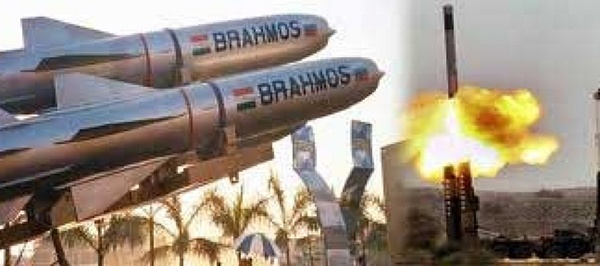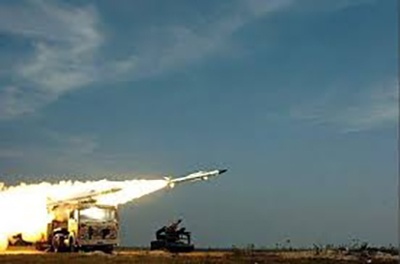Business
10 countries want to buy Indian BrahMos supersonic cruise missiles, and Akash SAM missile systems

BY S VENKAT NARAYAN,
Our Special Correspondent
NEW DELHI, January 9: India’s plan to emerge as a major arms exporter and bolster strategic ties with “friendly” countries is gaining traction. At least 10 countries want to buy the Akash surface-to-air missile systems, the BrahMos supersonic cruise missiles, and other weapons.
The case for exporting BrahMos missiles, developed jointly with Russia, to the Philippines is already with the Cabinet Committee for Security for final approval, according to sources in the Indian defence ministry.
At least five other countries have shown interest in acquiring the BrahMos missiles. They are: Indonesia, Vietnam, UAE, Saudi Arabia and South Africa. The 290-km range BrahMos has emerged as the “precision-strike weapon of choice” for the Indian armed forces.
 And there are nine countries which have shown interest in the indigenously-developed Akash missile systems, which can intercept hostile aircraft, helicopters, drones and subsonic cruise missiles at a range of 25-km. They are Kenya, Philippines, Indonesia, UAE, Bahrain, Saudi Arabia, Egypt, Vietnam and Algeria.”Being over 96% indigenous, there is no need to seek any third country’s concurrence to export Akash. For BrahMos, Russia has to be on board,” said a source.Though the range of BrahMos is now being extended to over 400-km, with India and Russia even planning to test an 800-km variant this year, the export version will be the 290-km one. “This is due to the Missile Technology Control Regime (MTCR), which prevents proliferation of missiles over 300-km range, and some other issues,” said the source.
And there are nine countries which have shown interest in the indigenously-developed Akash missile systems, which can intercept hostile aircraft, helicopters, drones and subsonic cruise missiles at a range of 25-km. They are Kenya, Philippines, Indonesia, UAE, Bahrain, Saudi Arabia, Egypt, Vietnam and Algeria.”Being over 96% indigenous, there is no need to seek any third country’s concurrence to export Akash. For BrahMos, Russia has to be on board,” said a source.Though the range of BrahMos is now being extended to over 400-km, with India and Russia even planning to test an 800-km variant this year, the export version will be the 290-km one. “This is due to the Missile Technology Control Regime (MTCR), which prevents proliferation of missiles over 300-km range, and some other issues,” said the source.
The Akash export version will also be slightly different from the one inducted by the Indian armed forces. The 100-km range air-to-air Astra missiles, now entering production after successful trials from Sukhoi-30MKI fighters, also have “good export potential”, said sources.India will have to export “bigger weapon systems” if it wants to come anywhere near the ambitious annual export target of $5 billion (INR365 billion) by 2025. Towards this end, the Union Cabinet on December 30 approved the export of Akash systems.It also set up a committee with Defence Minister Rajnath Singh, External Affairs Minister Dr Subrahmanyam Jaishankar and National Security Advisor Ajit Doval to “authorize subsequent exports” to various countries in an expeditious manner.
Both BrahMos and Akash are “tried, tested and successfully inducted systems”. Indian armed forces have ordered Akash systems worth INR240 billion over the years, with another contract for INR100 billion on the way now. Contracts for BrahMos, in turn, have already crossed INR360 billion.
Meanwhile, India continues to be the second-largest buyer of foreign weapons in the world after Saudi Arabia, accounting for 9.2% of the total global arms imports during 2015-2019. Currently India exports some smaller weapons, components and ammunition. In 2018-2019, its arms exports crossed the one-billion-dollar mark for the first time.
- News Advertiesment
See Kapruka’s top selling online shopping categories such as Toys, Grocery, Flowers, Birthday Cakes, Fruits, Chocolates, Clothing and Electronics. Also see Kapruka’s unique online services such as Money Remittence,News, Courier/Delivery, Food Delivery and over 700 top brands. Also get products from Amazon & Ebay via Kapruka Gloabal Shop into Sri Lanka.
Business
Unlimited music streaming platform in Sri Lanka

SLT-Mobitel, the nation’s ICT and Telecommunications Service Provider recently partnered with Spotify, to mark their launch in Sri Lanka. Spotify is a paid premium music streaming app which allows subscribers to listen to music to their hearts content. Both, SLT-Mobitel Post-Paid and Pre-Paid customers will now be able to enjoy Spotify by activating a monthly recurring subscription or one-time subscription plan and access unlimited music streaming and downloading facilities.
The subscription charges will get added to the user’s customary billing, where payment will be deducted in real time. Starting from the payment date, the user will be able to access Spotify and download their favourite songs, for the next 30 days. Users who sign up for their first monthly subscription will receive an additional one month, courtesy of Spotify. The one-month subscription plan is not applicable with one-time subscription plans. SLT-Mobitel data rates, depending on the user’s respective broadband charges, will apply.
Spotify also has some exciting features that will provide SLT-Mobitel customers with the opportunity to listen to ad-free music, access millions of uninterrupted music under one platform, play any song they like, anywhere they go, and also be able to enjoy their music offline.
SLT-Mobitel customers can select their preferred premium package under four categories; Individual, Duo, Family, Student. Each category has recurring and non-recurring plans. After one month of free streaming, the package will activate once the offer period terminates. While both, the Individual and Student premiums are limited to one account user, the Duo package offers two accounts and the Family premium is accessible through six accounts. To view Spotify plans, users can log on to https://spoti.fi/3aLWvce
Business
Sri Lanka using ‘sovereign power’ over economy: CB Governor

by Sanath Nanayakkare
Anyone conversant with the elements of a political economy would know that Sri Lanka is using its ‘sovereign power’ to manage the different dynamics of the economy in a sustainable manner, Professor W. D Lakshman Governor of the Central Bank said on Wednesday.
“Some critics are saying that we adopt a so-called modern monetary theory. That’s not the case. In fact, Sri Lanka is using its sovereign power in a number of economic aspects to honour its external debt repayment commitments as well as to reduce its debt burden in the medium term as well as achieve resilient growth in the medium to long term, he said.
“We make policy decisions to boost our gross foreign reserves, meet our external debt servicing, to facilitate monetary expansion, to boost our GDP growth, to strengthen our current account balance and manage our domestic and external economic variables in a sustainable manner. This is not a modern monetary theory. This is an age-old tool used by central banks around the world when the circumstances demand it, he said.
“Certain trade-offs will be necessary when dealing with an economy which has a big fiscal gap to bridge. There are efforts to push Sri Lanka towards the IMF again which would in turn have influence on our policymaking. We have taken policy measures to stabilize the economy and we have adequate reserve levels to meet our debt repayments. Meanwhile, we are in negotiations with overseas central banks and multilateral agencies to further boost our reserve level and it would materialise within a matter of weeks,” he noted.
“One of the tools the Central Bank has introduced is in respect of repatriation of export proceeds into Sri Lanka and conversion of such proceeds into Sri Lankan rupees in order to strengthen the foreign exchange situation of the country,” he said.
The Governor made these remarks while delivering the keynote speech at a webinar organised by the Veemansa Initiative led by its Managing Director Luxman Siriwardene – the former Executive Director of Pathfinder Foundation.
The webinar revolved round the topic ‘External debt situation in Sri Lanka: Are we heading for a resolution or crisis?’
Professor Sirimal Abeyratne, Prof. Sumanasiri Liyanage, Dr. Nishan de Mel and Dr. Ravi Liyanage were the other speakers on the panel.
Business
CSE on the rebound; indices close positive

By Hiran H.Senewiratne
CSE produced signs of a rebound yesterday with both indices closing positive, though turnover remained low. Central Bank Governor W.D Lakshman’s recent statement on managing foreign reserves gave some boost to the market yesterday, stock market analysts said.
The index experienced a zigzag movement within the early hours of trading; thereafter, it recorded a slight up-trend as it reached its intraday high of 7,439. Later, the market witnessed a down-trend at mid-day, followed by a sideways movement and closed at 7,372, gaining 43 points during the month of February, market sources said.
It is said the banking sector dominated turnover with a contribution of considerable parcel trades in Sampath Bank, Commercial Bank and HNB.
Further, the Commercial Bank’s impressive quarterly results during the recent turbulent period also built investor confidence. Commercial Bank was able to register a18 percent net interest income when other banks were reporting a decline. Its share price increased by Rs. 3 or 3.5 percent. On the previous day, its shares started trading at Rs. 85 and at the end of the day they moved up to Rs. 88. Due to the positive growth results, the bank announced a Rs. 4.40 dividend per share, plus a Rs. 2 script divergent for every share.
Further, Sampath Bank shares also appreciated in both crossing and retail. In crossings its shares appreciated by Rs. 1.At the end of the day they moved up to Rs. 154.50. In the retail market, its shares moved up by Rs. 2 or 1.3 percent. Previously, its shares fetched Rs. 154 and at the end of yesterday they moved up to Rs. 156.
Amid those developments, both indices moved upwards. The All Share Price Index went up by 104.48 points and S and P SL20 rose by 67.78 points. Turnover stood at Rs. 3 billion with four crossings. Those crossings were reported in Sampath Bank, where 3.9 million shares crossed for Rs. 602.2 million, its share price being Rs. 154.50, HNB 375,000 shares crossed for Rs. 39.4 million, its shares traded at Rs. 105, Pan Asia Power 9.5 million shares crossed for Rs. 33.2 million, its shares traded at Rs. 3.50 and Access Engineering 1.2 million shares crossed for Rs. 28.2 million; its shares traded at Rs. 24.
In the retail market top five companies that mainly contributed to the turnover were, Expolanka Rs. 450 million (10 million shares traded), JKH Rs. 205 million (1.3 million shares traded), Browns Investments Rs. 199 million (34.9 million shares traded), Sampath Bank Rs. 191 million (1.2 million shares traded) and Dipped Products Rs. 137.7 million (2.8 million shares traded). During the day 101 million share volumes changed hands in 18046 transactions.
During the day, Expolanka, the biggest contributor to the turnover, saw its share price appreciating by Rs. 6.20 or 15 percent. Its share price quoted on the previous day was Rs. 41 and at the end of trading yesterday it moved up to Rs. 47.
Sri Lanka’s rupee quoted wider at 193.50/195.50 levels to the US dollar in the spot next market on Thursday while bond yields remained unchanged, dealers said. The rupee last closed in the spot market at 194.50/195.00 to the dollar on Wednesday.









